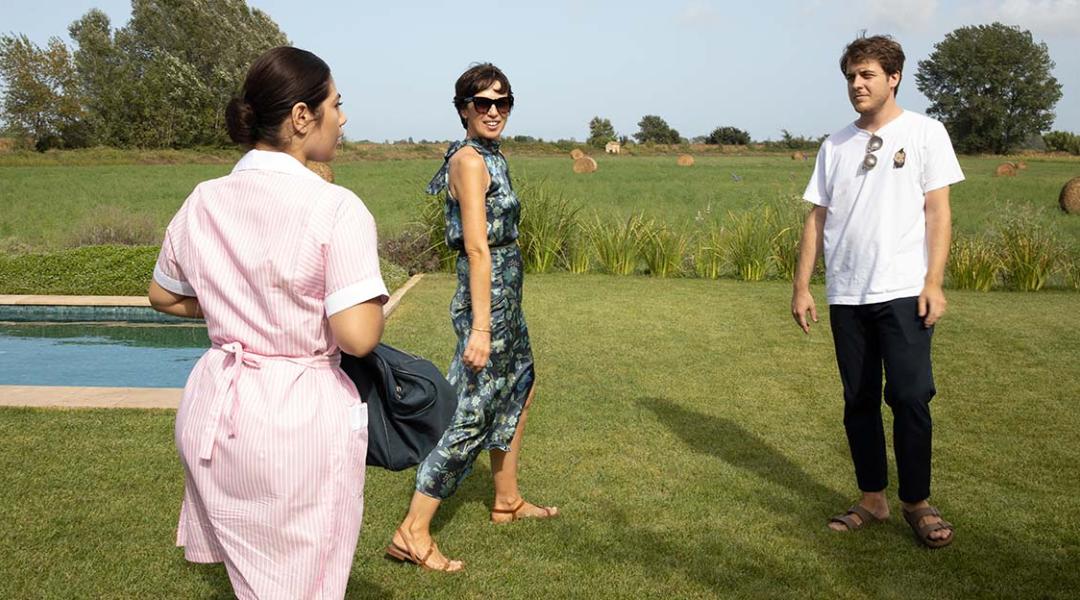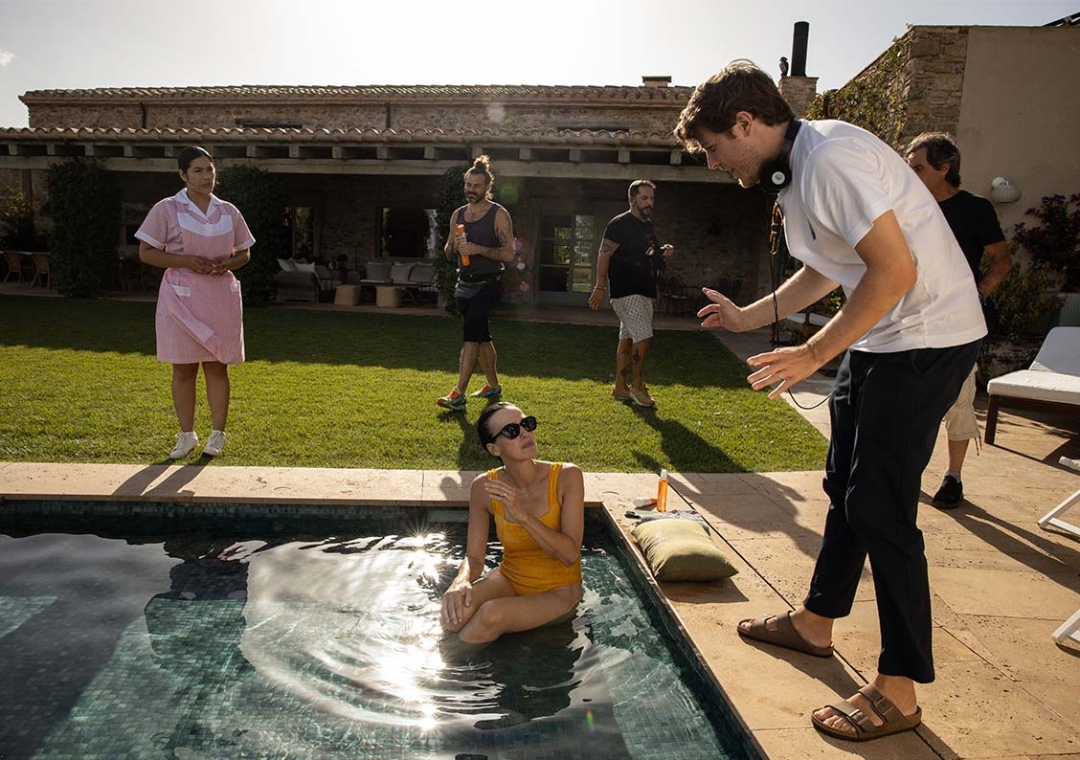Miguel Faus
A cinematographic future

New director Miguel Faus is in the midst of producing 'Calladita' [Quiet], a film that, paradoxically, is giving people plenty to talk about. The reason: it’s the first in the world funded by NFTs to start filming. We chat to him about this feat, which could change the way films are funded, about the difficulties young people face to pull off their projects, and about his great passion.
“We artists are known for our work,” is the first thing Miguel Faus (Barcelona, 1992) says during our chat. His, for now, includes two acclaimed short films: The Death of Don Quixote (2018) and Calladita (2020). His leap to full-length film, adapting his second short, hit the headlines a few months ago: “The first NFT-funded European film,” they announced. Miguel himself, already immersed in filming [which started at the beginning of September with cast members Paula Grimaldo, a repeat protagonist, Ariadna Gil, Luis Bermejo, Pol Hermoso, and Violeta Rodríguez], gives us an update: “Calladita is the first NFT-funded fiction film to start filming in the world.” Miguel and his team have beat Julie Pacino —yes, the daughter of— to it, despite the fact that she achieved funding first. Before delving into what that process has been like, we try to get a better sende of Miguel the filmmaker.
Where does your passion for film come from? Do you remember a specific moment?
Yes, I remember the summer that I saw Pulp Fiction at the age of 16. I loved it, but above all it aroused curiosity within me, and I started to read up on Tarantino. That’s how I discovered his distinguishing features —for example: his shots of women’s bare feet, shots from inside a boot, etc.— and, in that moment, I understood what a film director was, they’re like a novelist, a composer, or a painter. I always thought I was artistically inclined, I even tried music or painting, but when I discovered this, I was smitten. Film is an art form that includes them all and is endless.
If I talk about role models, people who inspire you, which directors come to mind?
I struggle to quote specific names because I’m a really omnivorous film buff, but to not dodge your question I’ll say that my cinematic god is John Ford. More recently, I really enjoy films by female directors like Céline Sciamma, Alice Rohrwacher, Chloé Zhao, or Kelly Reichardt. And here we have Carla Simón.
“There are more than 400 people, most of whom I don’t know, who’ve decided to support 'Calladita' because they believe in this project”
You yourself have interviewed many directors for magazines like Jot Down. Who would you like to interview (or would have liked to have interviewed)?
John Ford is my god, but I wouldn’t have interviewed him because he didn’t like to talk about his films. He’d always dodge the issue and never shared his secrets (laughs). I also would have liked to have interviewed Hitchcock, but it’d be a bit absurd because Truffaut already asked him everything. So, if I had to choose one, I’d say Scorsese.
Focusing on Calladita, how did you end up funding it with NFTs?
I made the Calladita short in 2019 and it did quite well at festivals. I worked on the script and presented the project to quite a few development programmes and was selected by the Short to Feature Lab by Jim Cummings in Los Angeles. But when it came to the funding phase, everything came to nothing. I started to do the rounds with producers, and it was disheartening... So, I tried to fund it with my own production company, but that also didn’t pan out. I felt like I had no control over my destiny as a filmmaker, that I didn’t know when I’d be able to make the film. At the same time, I accidentally discovered NFTs. I read several articles —I had time because this was during lockdown— and as I delved deeper, I realised that they were the future. I understood that I could bring the world of NFTs to the film industry —there was nothing at the time— and fund the film that way.

Miguel Faus, director of 'Calladita' talks to Ariadna Gil during the first day of shooting. © Albert Masferrer
So, in your experience, how difficult is it to take the leap from short to full-length film?
It’s really hard, but I don’t want it to sound like I’m complaining because I think it’s normal for it to be difficult. It’s really expensive and you have to earn it, so to speak.
What challenges has turning a short like Calladita into a feature film entailed?
I always wanted Calladita to be my first full-length film, so I already know the tone and that helps. But there are several challenges: as a scriptwriter, it’s quite complex because you have to hold people’s attention for 100 minutes; and as a director, it’s quite similar, but you need to be clear on the essence of the film. Let me explain: you can watch an entire short in a brief period of time —Calladita consisted of 90 scenes—, but a feature film means you have to spend hours thinking to visualise the ensemble. There need to be some key ideas to cling to that act as a guide throughout the process.
And for those who haven’t seen the short, what story will Calladita tell?
It tells the story of a Latin-American housemaid that works for a rich family from Barcelona over the summer. It’s a story of empowerment and liberation within that context of large social divides. At the same time, it’s also a social satire about that whole world of haute bourgeoise, especially in Catalonia.
“A film doesn’t work because a muse comes and tells you how to make it. So, talent is, above all, hard work”
In 2021, Variety magazine noticed your talent and chose you as one of the 10 filmmakers from Spain on the rise. Are those expectations daunting?
At the risk of sounding arrogant, not really, because I think I’ve proven that I deserved it. Emilio Mayorga, who made that list, will now be proud of having included me because the whole NFT feat proves that I knew something. So, if anyone has followed me since then up until now, I don’t think they can feel disappointed (laughs). Also, I feel certain validation because more than 400 people, most of whom I don’t know personally, have decided to support Calladita with at least 400 euros —some much more than that— because they believe in this project and want the film to be made.
The recognition you have received up until now, including the Méliès d'Argent Award for Best European Production Short Film at the Sitges Film Festival in 2018 for The Death of Don Quixote, attests to your talent, but what does that word mean to you?
Oof... that’s really hard. If I define it based on my own experience, I almost wouldn’t call it talent, because really, it’s hard work. It’s constant hard work because nobody gives you anything for free. Also, a lot of conviction. Regarding the artistic side, as a filmmaker there’s a lot of self-analysis. A film doesn’t work because a muse comes and tells me how to make it. So, talent is, above all, hard work.
As a young filmmaker who has had to use new technologies like NFTs, do you think the film industry is undergoing a moment of disruption?
In terms of NFTs, it’s too soon to tell. Globally, there is a community of independent filmmakers using NFTs and blockchain to fund their projects, and I believe this will continue because it has a lot of disruptive potential, especially for films with modest budgets. Beyond that, I’m not really sure where we’re heading, but I hope that cinemas survive and that in the world of streaming, creators get a better deal.


